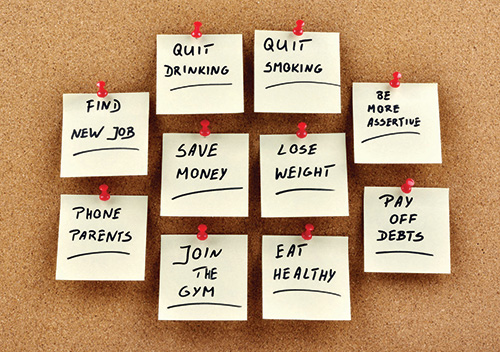January 14, 2016
By Janelle Gonyea
At the start of a new year, we all think of New Year’s resolutions that we would like to make. To proceed with these changes, one must set goals. When you have chronic kidney disease (CKD), goal setting is an important step in managing your medical condition. Goals can guide you toward the change you want to make and help you move in a positive direction. Achieving your goals may help you feel better and will help you build confidence in your ability to self-manage your condition. Areas for change that you might want to consider include nutrition, medications, physical activities, emotions, relationships, leisure and recreational activities and occupational activities.
Goal setting should be done very deliberately, thus there are a few things to keep in mind as you establish your goals. Start slowly and try to not overdo it as you will be more successful taking small steps. It is helpful to have both long term and short term goals. A long term goal is like the final destination of a journey. Once you have this goal, it becomes easier to set the short term goals that can help you reach that long term goal or destination.
It is important to set “SMART” goals. SMART stands for:
- Specific – state exactly what you want to achieve
- Measurable – how you will know you’ve met your goal
- Attainable – every goal should be within reach
- Realistic – consider your limitations
- Trackable – record your progress to keep moving forward
Keep in mind that changing behavior and thoughts is not easy and thus requires commitment and effort. As a rule, you will go through several stages as you change your behavior. This process is called Stages of Change. The six stages include:
- Waiting - the period of time before you have committed to making a change
- Exploring - you think about changing your approach and seek information about developing healthy habits
- Planning - you create an action plan of the steps you will need to take to achieve the goal
- Acting - you take the first steps in your action plan
- Maintaining - a very important stage as this is where you take further steps to make sure that your new behavior will last
When you can continue a new behavior for at least six months, your lifestyle change is more likely to last and thus you’ve succeeded.
It is believed that you are more likely to achieve goals when you write them down. This allows time to reflect on what you want to achieve and more fully commit to the change, making it more lasting. Be sure to ask yourself “How sure am I that I can do this?” and rate that answer on a scale of 1 to 10 with 1 being not sure and 10 being very sure. If your answer is a “5”, go back to the SMART principles and Stages of Change to see how you can modify your goal to get that number closer to “10” to set yourself for success.
When changing behavior, you may find yourself at times going back to old habits. Try not to become too upset about these setbacks. Accept that they happen and move on. Remain positive. If you have trouble achieving a short term goal, try to figure out what triggers those old habits and go through the SMART principles again to modify that goal so you can be more successful. Remind yourself of the long term goal and why it is important to you. Ask family and friends to help you overcome obstacles. Your health care team can also provide additional help or support, so ask them to help you as well.
With so many aspects of care, it can be difficult to do everything all at once, so it is helpful to set goals and prioritize what is most important to you. Apply these principles of goal setting to ensure success and don’t be afraid to ask for help.









